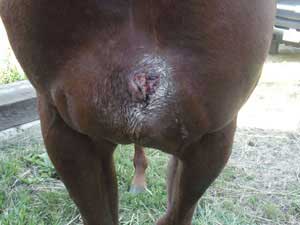Be Prepared For A Horse Emergency

Written by Preston Hickman, DVM, Wichita Equine and Sports Medicine
Horses are like kids; if you're around them long enough, you’re going to have an emergency. You must learn to recognize serious problems and respond to them promptly; taking appropriate action will ensure the best outcome. From lacerations, colic, foaling difficulties and many more, preparation is vital when confronted with a medical emergency. Being mentally prepared and having the proper supplies on hand will help ensure panic does not take control when you're faced with a medical emergency.
- Know where your veterinarian's phone number is located.
- Know the numbers and directions to the local emergency room in case a human is injured alone or in conjunction with an equine medical emergency
- Consult with your regular veterinarian regarding a referral veterinarian in case he or she cannot be reached.
- Make arrangements with friends or neighbors who can assist you in case of an emergency.
- Have a backup trailer available in case your trailer is not usable
- Have the phone numbers of nearby friends, neighbors, and relatives along with your veterinarian's phone number posted in case you're not around when an emergency happens
- Know where the first aid kit is and have it adequately supplied should the need arise. First aid kits can be simple or elaborate, but some essentials that they should contain are:
• cotton rolls
• cling wrap
• gauze pads
• scissors
• thermometer
• stethoscope
• surgical gloves
• surgical scrub and disinfectant solution
• alcohol
• wound flush: either saline or the commercially available wound flushing agents
• electrolytes
• cold packs
• blood clotting agent
• topical wound dressing
• clippers
Though accidents happen, taking the time to evaluate the environment and removing potential hazards is a crucial part in being prepared. Planning for an emergency and removing potential hazards in the environment will help you stay prepared if and when one should arise. By acting quickly and promptly serious consequences can be avoided. Contact your veterinarian as soon as you have assessed the emergency even if you are not sure his assistance will be required. It is better to inform him or her and not need them than to not allow them the time to prepare in order to serve you and your horse to the best of their ability.
About the author:
Dr. Preston Hickman practices veterinary medicine in Wichita, Kansas, specializing in equine podiatry and sports medicine. He combines traditional veterinary medicine with video gait analysis to diagnose physical problems and abnormal motion in horses. His experience as a farrier and chiropractor allow him unique perspective into biomechanical movement. Dr. Hickman has worked extensively with horse wellness issues as Assistant Medical Director for the Louisiana Racing Commission, overseeing four tracks and 16 veterinarians. Dr. Hickman has a background in mixed practice, equine and bovine veterinary medicine, as well as veterinary consultation to feedlots.


